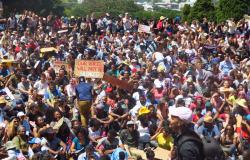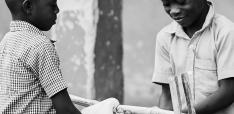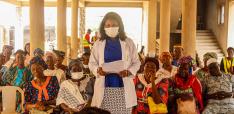Taking the Colonial Bull by the Horns: The Everyday Aspirations and Resistance of Disabled and Black Students in Nigerian and South African Universities

This is the seventh chapter in a forthcoming e-book, entitled 'Decolonial Education and Youth Aspirations'. Moffat Machiwenyika and Abass B. Isiaka unpick the mosaic nature of the calls for the decolonisation of universities pursued by students on the margins of higher education policies and practices.
"We are not just the same. Although, nobody wants to be disabled. Nobody likes to be looked down upon because they are disabled. But, you should give the disabled people options…It is wrong for us to be subjected to one particular system, we are not just the same" (Naomi, Interview at FUA).
In this chapter, we examine students' aspirations for a decolonised higher education through the quotidian demands of racial and disabled identities within higher education (HE) institutions in South Africa and Nigeria. We frame aspiration as a phenomenon that embodies the dreams and goals of students, and in their absence, focus on achievement and progress diminishes.
While the concept of aspiration is subject to numerous interpretations and applications (Appadurai, 2004; Hart, 2012), aspirations, driven by conscious and unconscious motivations, are inherently future-oriented cultural capacity and reveal an individual or group’s commitment to a specific endpoint. According to Appadurai (2004), aspirations are “not simply individual as they are always formed through interaction with and in the thick of social life”. Following Appadurai, we explore students’ “capacity to aspire, to voice, to debate, to contest and oppose vital directions” of the colonial university (p.66).
We sought to understand how the unique but historically connected students’ aspirations at a second-generation university in Nigeria, and two different institutions (historically advantaged and historically disadvantaged) in South Africa, formed the basis of their hopes for a decolonised higher education. This exploration revealed the strong visions that students from diverse backgrounds hold for a decolonised university. As shown by Naomi in the opening quote, the aspirations were typically expressed through a more grounded perspective on the right to aspire differently rather than an overly optimistic interpretation of decolonisation. In the following sections, we look at the debates on decolonisation of HE in Africa before presenting the decolonial aspirations of students from the two countries.
Debates of decolonisation of HE in Africa
The failure of the discourse of transformation and its sluggish pace to lead to profound change has led to a resurgence of calls for decolonisation and increased student protests (Ndlovu-Gatsheni, 2023). The #Fallism movement in South Africa’s higher education from 2015 revitalised the decolonisation discourse. According to Mbembe (2019) the concept emerged from the collective struggles of academics and students in higher education, focused on dismantling racial and social inequalities and advancing social justice. “Decolonisation” is a contested concept that has been used in manifold ways (Choat, 2020 p.1). A consensus exists among scholars that decolonisation is a nuanced and layered process (Le Grange, 2018). It fundamentally rejects the tenets of modern colonial education, which sought to redefine the colonised as mere subjects, thus depriving them of their humanity and capacity for growth. Colonial powers subjugated not only the land of the colonised but also enslaved their bodies and minds.
Decolonisation, thus, emerges as a foundational framework for dismantling oppressive structures and advancing social justice within universities. Scholars in inclusive education studies (Meekosha 2011, Grech 2015; Kamenopoulou 2020) also highlight the need for disability studies to engage with the postcolonial locations of disability in the majority of the world. This involves creating spaces for disability advocacy and participation, ensuring that persons with disabilities have a meaningful voice in shaping policies and practices that directly affect their educational experiences. Recognising the integral role of universities in social reproduction and knowledge creation, decolonisation in higher education has become a focal point for social movements and scholarly discourse globally. While 'decolonisation' is commonly invoked to convey diverse critiques of higher education, significant contention exists regarding its meanings and practical implementation within universities (Jansen, 2017; Pandor, 2018). While often discussed, decolonisation of higher education is primarily an academic discourse and does not appear in the current plan of the National Universities Commission in Nigeria or the Department of Higher Education and Training (DHET) in South Africa (Heleta & Dilraj, 2024). Literature on decolonisation in African higher education commonly highlights four key areas: curriculum, pedagogy, knowledge production (research) and institutional culture, with scholars calling for their decolonisation. Undeniably, the curriculum features prominently in the literature addressing decolonisation debates within South African universities (Mbembe, 2018). Scholars argue that African universities’ Westernised and Eurocentric curricula may no longer serve their intended purpose (Senekal and Lenz, 2020). Pedagogy is intrinsically linked to decolonisation of curriculum, given that both engage with core issues of teaching and learning; however, there is limited theorisation regarding what decolonisation entails for higher education pedagogy in South Africa. While the idea of an anti-racist curriculum has existed for some time, many lecturers in higher education have not moved from a decolonised curriculum to a fully decolonised pedagogy. Scholars have advocated for a “humanising pedagogy” (Freire, [1970]2005), embedded in decolonial and indigenous perspectives (Zembylas, 2018).
Alienating institutional cultures prominently emerges as a key issue, underpinning student protests and the demand for decolonisation in higher education institutions and their iconographies (Jansen, 2009; Suransky and Van der Merwe, 2016). Scholars assert that most universities’ cultural and structural dynamics continue to spawn the legacies of colonial Western universities, from which African higher education systems have developed (Lebakeng, Phalane & Dalindjebo, 2006) with deeply rooted institutional cultures still disadvantaging many Black students (Badat & Sayed, 2014) and disabled students (Isiaka, 2023). Decolonising research is also key to rewriting histories, resisting oppression, and realigning knowledge production and perspectives for the advancement of both the nation and the broader African continent (Heleta, 2016; Ndlovu-Gatsheni, 2018). As Arowosegbe (2016) and Adebanwi (2016) noted, knowledge production in Africa is still structured by the dynamics and nature of Africa’s insertion into the modern – originally mercantilist, later neoliberal and now globalising – Euro-American civilisation. Decolonising research and knowledge production thus requires moving away from conventional Western theories, instead embracing interpretations grounded in individual experiences and perspectives of the universe (Mamdani, 2016).
Notes on Methods
The research on disability inclusion in Nigerian Higher education was an institutional ethnography (Smith, 2005) that worked with student associations (National Association of Nigerian Deaf Students (NANDS), Association of Visually Impaired Students (AVIS) and Association for Students with Physical Impairment (ASPI) to explore their aspirations for an inclusive future for universities in Nigeria. Through a six-month ethnographic study at the Federal University of Arewa (FUA) (pseudonym) in Nigeria, AI interviewed student leaders on their everyday resistance to the lack of adequate support and resources to understand the “fixing work” that SWDs do at the FUA.
For South Africa, a qualitative case study methodology was used to explore university students’ aspirations for a decolonial higher education. In total, 22 semi-structured interviews were conducted with postgraduate students from two South African universities, comprising 12 from HAU and 10 from HDU. These students, enrolled in Master’s and PhD programmes, had been at their respective institutions since the first year of their undergraduate studies or for at least four years. They were interviewed because they had a thorough experience of their respective universities. The study also included student members of the SRC. The two institutions were chosen for their contrasting profiles: one, a historically advantaged, predominantly white university with a legacy of apartheid-era exclusion, and the other, a historically disadvantaged, predominantly black university in a rural area, reflecting a history of underfunding and educational challenges.
Decolonial Aspirations from Historically Advantaged and Disadvantaged University Students in South Africa
Historically Advantaged University
At the HAU, students' aspirations for a decolonised higher education centred on creating an inclusive, accommodating, and safe space—an Ubuntu-infused university—that fosters a sense of belonging for all students, irrespective of race, gender, culture, faith, spirituality, or beliefs. In their conception of inclusive spaces, some students highlighted the importance of intersectionality amongst others. Their aspirations were also based on their comprehension of decolonisation:
“I think for me, it will be an institution where a black person does not question their existence and does not question their belonging in a space, you know. It should be a space where you automatically feel welcomed and not even included, you automatically feel like you belong in the space. You do not have to struggle over very trivial issues, you know, just a space man, where the systems of the universities, the policies of the universities reflect the fact that you are welcomed, and you belong in the space as a black body.” (Fumane)
The quest for belonging reflects the broader challenges of students of colour in historically white institutions. His aspiration challenges the prevailing narrative of inclusion that according to him remains superficial, advocating instead for a decolonised university where belonging is inherent rather than contingent upon acceptance or recognition. His reference to ‘trivial issues’ highlights the everyday challenges that he faces within the institution emphasising the need for a comprehensive reform of institutional policies and practices. In this way, the student’s aspirations contribute significantly to the discourse on decolonisation, offering a vision of education that is inclusive, affirming, and equitable.
Several students’ aspirations for a decolonised university also focused on curriculum matters, with some arguing that the decolonisation of the curriculum is a significant issue that deserves attention, given the entrenched epistemic and hegemonic systems in most South African universities since the apartheid era:
“I think this would mean making a mind shift, ultimately, towards creating a curriculum that is free from bias, but it's truly presenting information to students, that is going to prepare them to better South Africa and to better Africa specifically.” (Javin)
Javin aspires for a decolonised curriculum that genuinely reflects the complexities of South Africa and the broader African landscape. Her notion of mind shift perhaps suggests that the traditional (Eurocentric) approaches to higher education may no longer suffice, advocating instead for a curriculum that actively resists biases and presents a more robust and authentic representation of knowledge. Javin’s focus on unbiased knowledge signifies an attempt to dismantle the historical legacies of colonialism that have shaped educational contexts, thereby enabling students to engage with their cultural contexts in a meaningful way. By advocating for a curriculum that resonates with students’ realities, there is a clear intent from the student to foster a decolonised university that prepares graduates to confront the pressing social issues of their time, such as poverty and inequality – prevalent in the South African context.
Historically Disadvantaged University
Students’ aspirations, considering the context of a historically disadvantaged university, predominantly reflected their socioeconomic status and various other attributes. Others centred their aspirations around curriculum, and concerns of exclusion, highlighting issues of access and the socioeconomic factors that have marginalised disadvantaged students from higher education. Consequently, their aspirations were aimed at addressing the existing challenges within the institution:
An education that can be able to be relevant to a rural based child, an education that can be relevant to even those people who are not privileged. An education that can be realistic to people who are coming, even from the deep, deep, deep rural areas. Yeah, that's the type of (decolonised) education that we need to have. In the institutions of higher learning, we need to have the type of education that is able to fit our African cultures (Melokuhle)
The above aspirations underscore the need for a decolonised higher education system that specifically addresses the unique challenges faced by students from historically disadvantaged backgrounds, particularly those from rural areas. According to Melokuhle, such students often grapple with significant barriers to access and succeed in higher education, stemming from a lack of resources, under-preparedness, inadequate cultural representation, and socio-economic constraints that hinder their academic journeys. By aspiring for a decolonised university that speaks to the realities of those from deep rural contexts, the student highlights the critical importance of creating learning environments that validate their identities and experiences.
Decolonial Aspirations and Everyday Resistance of Disabled Students in Nigeria
Three corresponding associations at FUA represent the interests of students with hearing (NANDS), visual (AVIS) and physical impairments (ASPI). The NANDS is as old as the Deaf Support Centre. It represents a cluster of Deaf students who were first admitted by the university based on the federal government’s policy for University Deaf Education in the late 1980s. This association has gained some traction within the university over time and has represented the interests of disabled students at the students’ union level. It has also been allocated a special constituency at the Senate Council of the students’ union. AVIS was established in 2017, when FUA first admitted its highest number of visually impaired (VI) students. These students came together to form an association that would pursue their interests and provide peer-to-peer support for admission, hostel accommodation, financial matters, and emotional support. Student leaders of these associations were confronted with how to change the university for people coming behind them and create more enabling spaces to participate. Students not only ‘aspire’ but also get to do what we describe as ‘fixing’ work, which involves students textually and viscerally negotiating with the “powers that be” in the university. Three examples of this fixing work are the demand to pass a legislative bill to address the “mislabelling” of students with disabilities on campus, demanding reasonable adjustments for admissions, and the provision of a resource room. These three issues cut across all clusters and are at the heart of student access to and participation in the university. Naomi, who was an executive member of AVIS , was asked about the issues they have advocated for as an association:
“We advocated for, first of all, the preferential treatment of not queuing for the bus; we had to demand for it. Okay, we had to advocate for hostel allocation before every other student. Post-UTME [Unified Tertiary Matriculation Examination] waiver, we advocated for it. If you are able to meet up with the cut-off mark for the UTME, there is no need for post-UTME. It was like a stress. Getting admission easily through the association, we also help advocate for it. Those were just the basics. And also, a resource room too. I think we tried working around getting a resource room.” (Naomi, VI, Interview at FUA)
She went on to say that some of their requests were met at the university, which had a spilled-over impact on national debates on disability inclusion in Nigeria. SWDs at this university recognised the deep-seated ableism in the system and have been aspiring and working to see a university built for people like them. When students were asked to imagine what an inclusive higher education should look like, Esosa concluded that;
"First of all. The teachers or the course reps should try to know or recognise those people that have special needs in the class. Once they see the number and the type of needs.
They should try to come to their level by asking them different questions about how they learn and cope. Then in class, they should ensure that whatever they are doing anyway teaching, the students are being recognised, and they are following." (Esosa, VI Interview at FUA)
Discussion and Concluding Thoughts
We have shown in this chapter the mosaic nature of the calls for the decolonisation of universities as pursued by students on the margins of higher education policies and practices. By juxtaposing the student movements and aspirations from South Africa advocating for curriculum decolonisation with Nigerian students’ efforts to "fix" their university system, we highlight the many ways to decolonisation of HE and why decolonial scholars must engage with the contrapuntal nature of decolonial futures of HEIs on the African continent. For example, Naomi’s statement— “We are not just the same... you should give disabled people options”—parallels South African students’ demands for decolonial curricula that reflect their realities – “{...} a mind shift, ultimately, towards creating a curriculum that is free from bias..” (Javin). These shared aspirations reflect a broader call to dismantle exclusionary structures in universities, and they challenge the vestiges and logic of the colonial/apartheid systems that created them. In doing so, we highlight the critical need for an inclusive, diverse approach to decolonisation that addresses the full spectrum of marginalised experiences in higher education.
We also explore how students' activism in both contexts challenges colonial legacies and ableist systems. For instance, the desire for transformation among South African students links with the advocacy for resource rooms and policy adjustments by Nigerian students as complementary acts of resistance against colonial institutional cultures. For instance, Esosa’s vision of inclusive classrooms aligns with broader decolonial goals of creating a university that validates diverse identities, while the South African students’ calls for a curriculum that “reflects the complexities of South Africa” could be contextualised within a disability framework, emphasising how inclusive education benefits all marginalised groups.
In both contexts, the studies show the gaps in institutional support (e.g., lack of resources and support systems) for disabled students in Nigeria and alienating institutional cultures in South Africa. Students, in both cases, desire a decolonial university as one that inherently values their identities, be it through a curriculum free of Eurocentrism or equitable access to education. Students also note the role of teachers in fostering inclusive and decolonial spaces, such as Esosa’s mention of teachers recognising students with special needs and adapting their approaches accordingly (reflecting how pedagogy itself can be a vehicle for decolonial transformation). This shows how teachers' attitudes and teaching practices could either perpetuate or dismantle exclusionary structures. This also resembles the sentiments from students from HDU – such as Melokuhle – advocating for an education "relevant to a rural-based child" and "to those people who are not privileged." These students, often grappling with considerable barriers to access and success in higher education, face challenges such as lack of resources, insufficient preparation, inadequate cultural representation, and socio-economic constraints, all of which hinder their academic progress. Thus, the call for decolonisation is not merely about the curriculum, but about transforming the entire educational experience to make it accessible, relevant, and inclusive for all students. These reflections resonate with the broader call for a "humanising pedagogy" (Freire, 2005), which centres the lived experiences of students and seeks to dismantle systems and structures that marginalise them. While systems are opening up by admitting those who have been historically considered non-traditional, their everyday life in the university is precarious, which means students will have to harness their everyday resistance through unionism or activism to challenge existing power structures by taking the colonial bull by the horns.
Dr. Abass B. Isiaka is a Senior Research Associate in Widening Participation at the Centre for Higher Education Research Practice Policy and Scholarship (CHERPPS) at the University of East Anglia, Norwich, United Kingdom.
Webpage: https://research-portal.uea.ac.uk/en/persons/abass-bolaji-isiaka
LinkedIn: Dr. Abass B. Isiaka
Dr. Moffat Machiwenyika is a Postdoctoral Research Fellow at the SARChI Chair in Teaching and Learning at the University of Johannesburg, South Africa. Dr Machiwenyika's research interests include decolonisation in the Global South, transformation, advancing social justice, and addressing inequalities in and through higher education, focusing on ensuring equal access, participation, and success for previously excluded groups. https://orcid.org/0000-0003-4201-8041
LinkedIn: Mophat Machiwenyika
Image: Flickr - Tony Carr, Public


